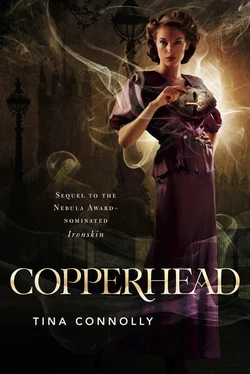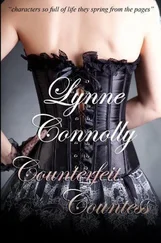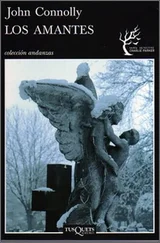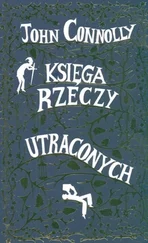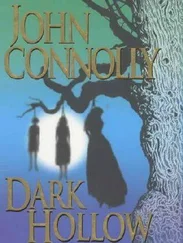But what gave Helen the shock, despite knowing it must be there, was to see those names etched out in those precise letters, one after the other, just two more women on the fey hit list, their names a record of their mistakes.
98—Helen Huntingdon.
99—Jane Eliot.
Chapter 5
PLAYING THE GAME
There was another good reason to start with Calendula Smith, and that’s that Helen knew where she lived—over by the Grimsbys. Helen had not spent any real time in the woman’s company, but she had been to a dance there once. It was in the last six months—well, nearly all of her social engagements dated from after she received her fey face—so she had not seen the woman’s new face. The iron masks were just coming into use for The Hundred, and this woman had one. Helen had watched them all whirling around the ballroom in their bright gowns and hard masks and felt more alone in a crowd than she had ever done in her life.
Helen had changed from the comfortable dress into something suitable for going out—a crisp wool suit in chartreuse. An unusual color, but one that brought out the glints in her copper blond hair. She had bowed to her blisters and put on her most comfortable shoes, and had tied a string of seed pearls around her neck. Went back and forth on Alistair’s new necklace, but in the end decided to leave it on. He was trying to make it up to her, wasn’t he? And it was pretty, even if it was Copperhead’s symbol. It wouldn’t hurt her to stay in their good graces while she slunk about town. She smoothed the chain down under the seed pearls, feeling the copper snake warm against her skin.
Helen knocked on Calendula Smith’s doorknocker (a plain hoop, thankfully), and waited for the butler to formally forbid her to cross the iron threshold. Soon she and Mrs. Smith were seated in the parlor, drinking bergamot tea and eying each other with mutually concealed dislike.
“Dear Helen,” said the woman. “It’s so good to see you.”
“And you, Calendula,” said Helen, not meaning a word of it. This woman had shunned her at first, for the ridiculous and tangled reason of being the best friend of a woman who had wanted Alistair for herself. Helen never could understand being so tied up over a man that you (and all your friends) would hate another woman for his sake. Surely the first woman could have thought of a more interesting reason to hate Helen. Hate her for her copper blond curls, hate her for her blue eyes. But really. A man? And now Calendula Smith, hating Helen merely to stay in her friend’s good graces.
Well, you played the game or it played you.
“Won’t you have another piece of cake?” purred Mrs. Smith. “You’re practically skin and bones.”
“I know, it’s a shame, isn’t it?” returned Helen. “And yet Alistair was just saying how glad he was I hadn’t let my figure go after marriage like some women.”
“Men! Who can predict their bizarre tastes.”
“I was just thinking the same.”
The initial pleasantries exchanged, Helen looked around the room under pretense of admiring it. It was all over roses. A pink rose sofa perched daintily on a red rose rug, and two tasseled rose chairs faced each other. Rose-pink curtains in a gauze that was the very height of fashion draped the windows. It was completely hideous, Helen decided with satisfaction. But she smiled and made nice about the roses (not to mention Calendula’s matching perfume) while deciding exactly how to play her hand.
“Now, Mrs. Huntingdon, come to the point. What can I do for you?”
Concern, Helen decided. Lead in with concern and goose it with gossip. “Well,” she said dramatically. “I was just talking to my sister, Jane, and she said she’d seen you the other day.”
Calendula tensed. Sort of around the shoulders, but Helen caught it. “I wasn’t very interested in her conversation,” Calendula said sharply. “Seems to me she should keep her nose in her own affairs.”
“I’m so glad you feel that way,” said Helen. “I told her it was unthinkable for a woman of your stature to go back to her old face.”
Those perfect eyes narrowed. “I have no idea to what you refer. More tea?”
“Certainly,” said Helen, and leaned back, studying the woman.
Calendula Smith’s fey-brilliant face seemed incongruous on that broad-shouldered, wide-waisted body. But when Helen looked again—no, the woman was stunning after all. Helen had seen it time and again, but that was the brilliance of what Mr. Rochart had done. He had made each person not into some cookie-cutter girl, but into the most dazzling version of themselves. It was why you couldn’t have said for sure with so many of them. You thought they were more beautiful—but was it that they were just more alive, more real?
This woman was not meant to be pretty. She was perhaps not meant to be a dainty little girl, although that was the sort of comment Jane was always chiding her for. But what else was Helen supposed to think? Mrs. Smith was built like a man, with a wide frame that strained against the panels of her mauve silk dress. A silk rose dangled incongruously from a waist that even the draped bias cut could not slim. “You should wear slacks,” Helen said, and then put a hand to her mouth, far too late.
“Excuse me?” said Calendula Smith.
Helen valiantly tried to save the situation. “They’re chic, I mean. I’ve been seeing them more frequently. I just thought you could carry them off.”
“Thank you, I suppose,” said Calendula, not sounding terribly mollified. “I’m not sure that slacks would be appropriate for a pillar of society. One has to set an example, you know.”
“One does,” agreed Helen. And then more gently she added, “And sometimes one has to do it by admitting mistakes have been made.” She carefully did not say by whom. “Sometimes only the pillars can lead the way.”
Calendula looked at her for a long time. At last, choosing her words with the air of someone stepping through a minefield, she said, “It’s not just that people are drawn to beauty—though they are. The new face comes with its own glamour—a charisma I never had. And … you don’t know it yet, Mrs. Huntingdon, but you get older and you become invisible. I work for the Children’s Mercy Hospital. I raise funds for them. When I started volunteering, I thought I could really do something. I had all these connections. And yet … people listened to me politely and then went about their business.
“But then I got the new face.”
Helen nodded, feeling the moment like a living thing between them, warm and growing. “And they listened.”
“They all listened. I raised so much money the first year.” Her words spilled out warm and impassioned. “Money we desperately needed. All those families who were barely getting by before their fathers died in the war. Mothers who had never had to ask for help before were bringing us children whose illnesses could have been prevented with better nutrition.…” Calendula suddenly recalled herself, and her face shuttered closed. “So you see that things are not as black-and-white as your sister would like to believe.”
Calendula thought she was set against Helen, but the connection between them was there. Helen could find it again. Helen set down her empty teacup and began to unbutton one of the sleeves of her chartreuse jacket. “Do you remember the May Day celebration at my house?” she said.
“I fear my invitation must have gone astray,” Calendula said tartly.
“I am glad to hear that, because it means you were safe,” said Helen, not batting an eyelash. “But surely you heard the rumors.”
“I did,” admitted Calendula. “Bosh, I thought at the time. But then the fey started coming into the city … and I wasn’t sure anymore.”
Читать дальше
